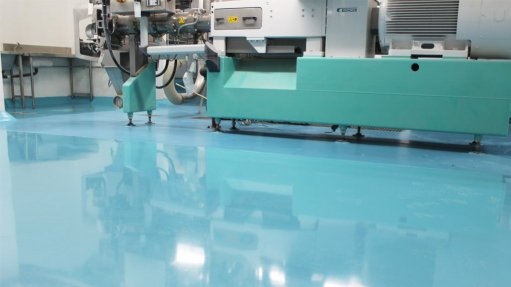
UNIQUE APPLICATION Verni installs its Supaflor PU HD 9mm polyurethane screed in industrial freezers because it can withstand extreme temperatures
Hygienic flooring is important in the food and beverage sector as it prevents the growth of bacteria in food-processing plants, says speciality construction products manufacturer Verni technical sales manager Peter Breiting.
He notes that hygienic flooring is also easier to clean than plain concrete floors.
“Any company involved in the manufacturing or processing of food products is required to maintain a high level of hygiene through-out the factory.”
Breiting cites that, from a flooring perspective, it is important to ensure that floors do not harbour bacterial growth. They also remain easy to clean and can withstand mechanical wear in a particular environment.
He explains that Verni installs its Supaflor PU HD 9 mm polyurethane screed in industrial freezers as it can withstand temperatures ranging from –40 ˚C to 120 ˚C, with the latter end of the range, making it possible for clients to steam-clean floors.
“It is also a requirement that there be no right-angled corners at the wall and floor junctures throughout food and beverage plants. To meet this requirement, we install a coved skirting at all wall and floor junctures, usually to a height of 100 mm.”
Breiting says that most South African food-processing companies realise the importance of hygienic flooring and adhere to current legislation.
He states that, while all floors still require some maintenance during their lifetime, making the correct choices in advance prevents downtime later for repairs.
“At Verni, we offer a unique service in that we manufacture and install our own systems, namely the Supaflor range of epoxy and poly- urethane screeds, offering our clients a unique single-line guarantee with no split responsibilities,” he says.
The latest trend globally in the hygienic flooring industry is the use of Argelith Hexalith tiles from Germany. These tiles are bedded and pointed in resin, providing clients who prefer a tiled environment with the look and feel of tiles, as well as the benefit of epoxy, which does not harbour bacterial growth like normal tile grout, explains Breiting.
“We are also proud to offer the Evonik MMA rapid curing system, which takes two hours to install and is ideal for factories that need limited downtime and cannot afford the time needed for the standard systems to cure,” he states.
Breiting notes that Verni also offers a nonslip system, which has a quartz aggregate that can be pigmented to a client’s requirements or supplied as a smooth pigmented system.
“The industry is always very busy and the demand is ongoing. The future certainly is very bright as there is opportunity for growth everywhere, with more companies growing and expanding,” he says, concluding that this pertains not only to greenfield projects but also to maintenance and upgrades to existing plants.